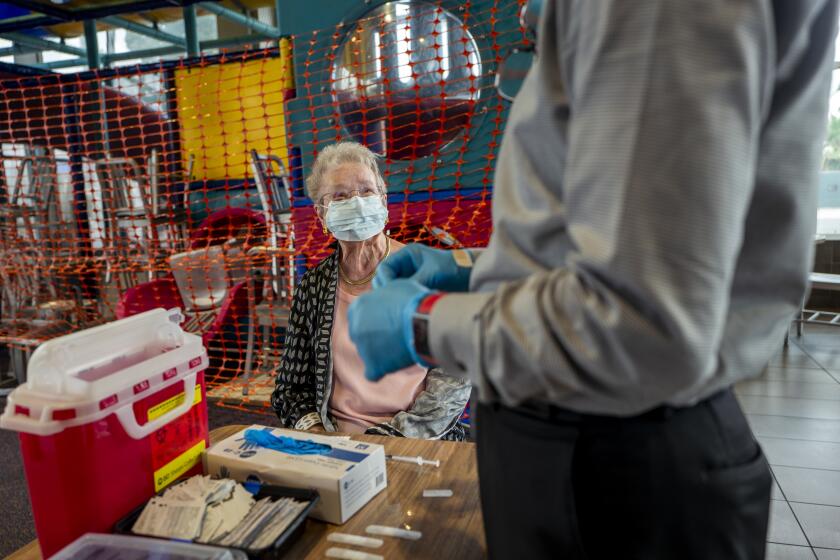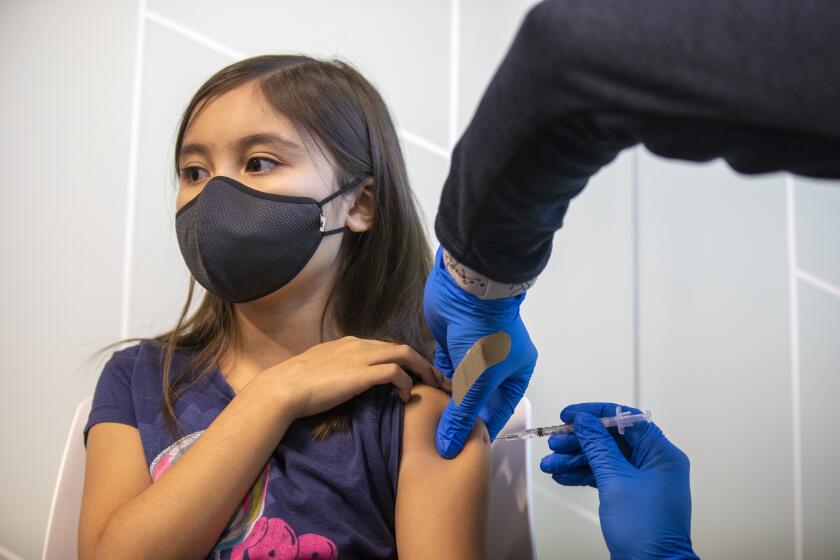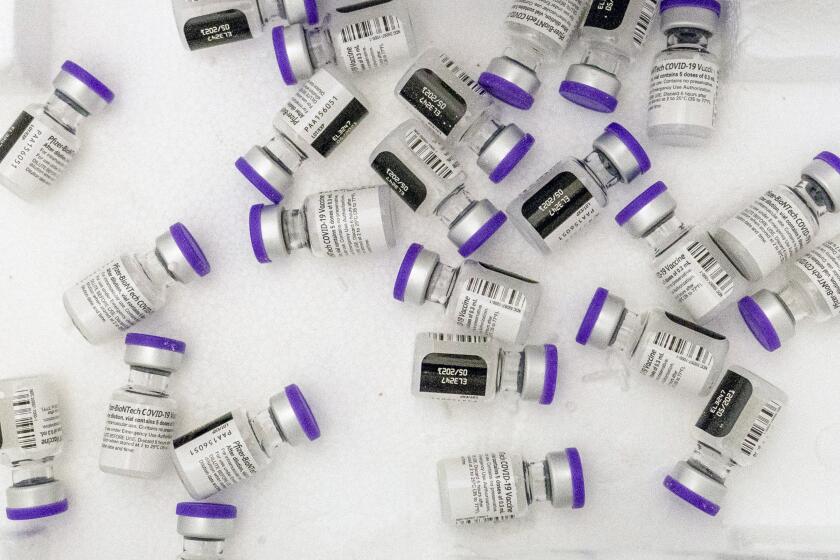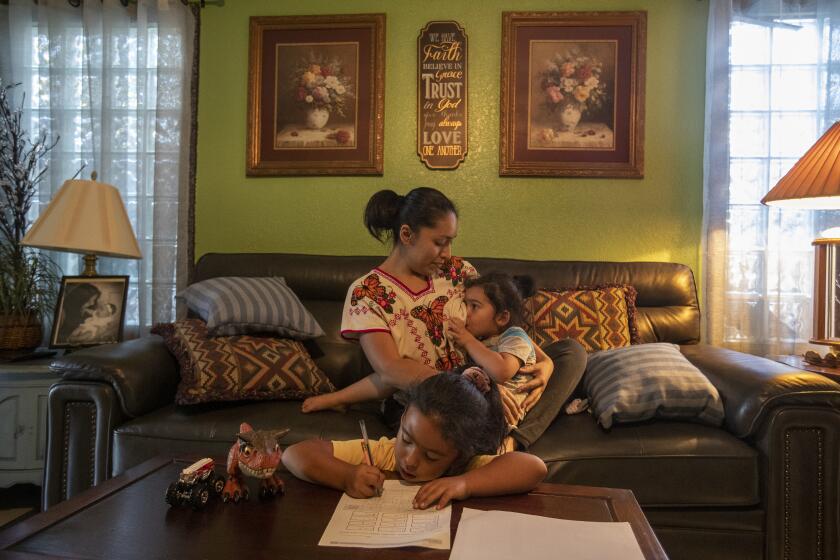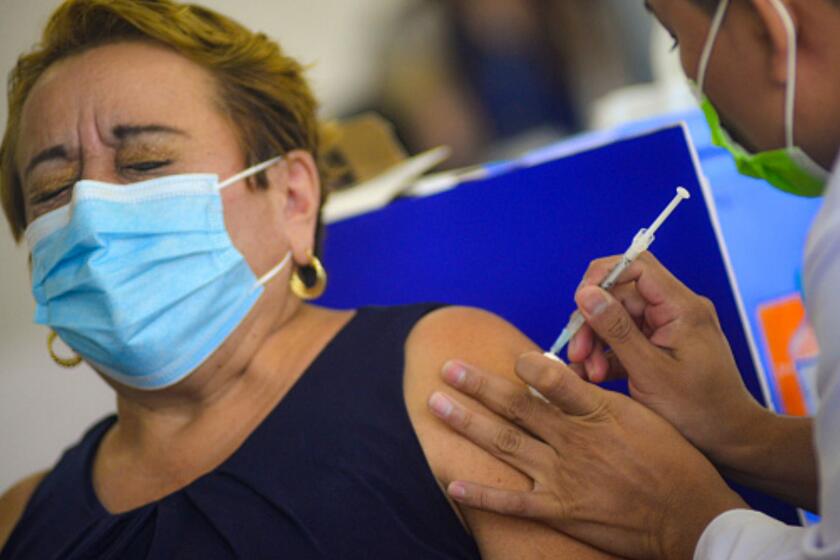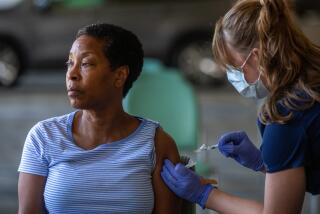Fearing a winter surge, California turbocharges its push for COVID booster shots
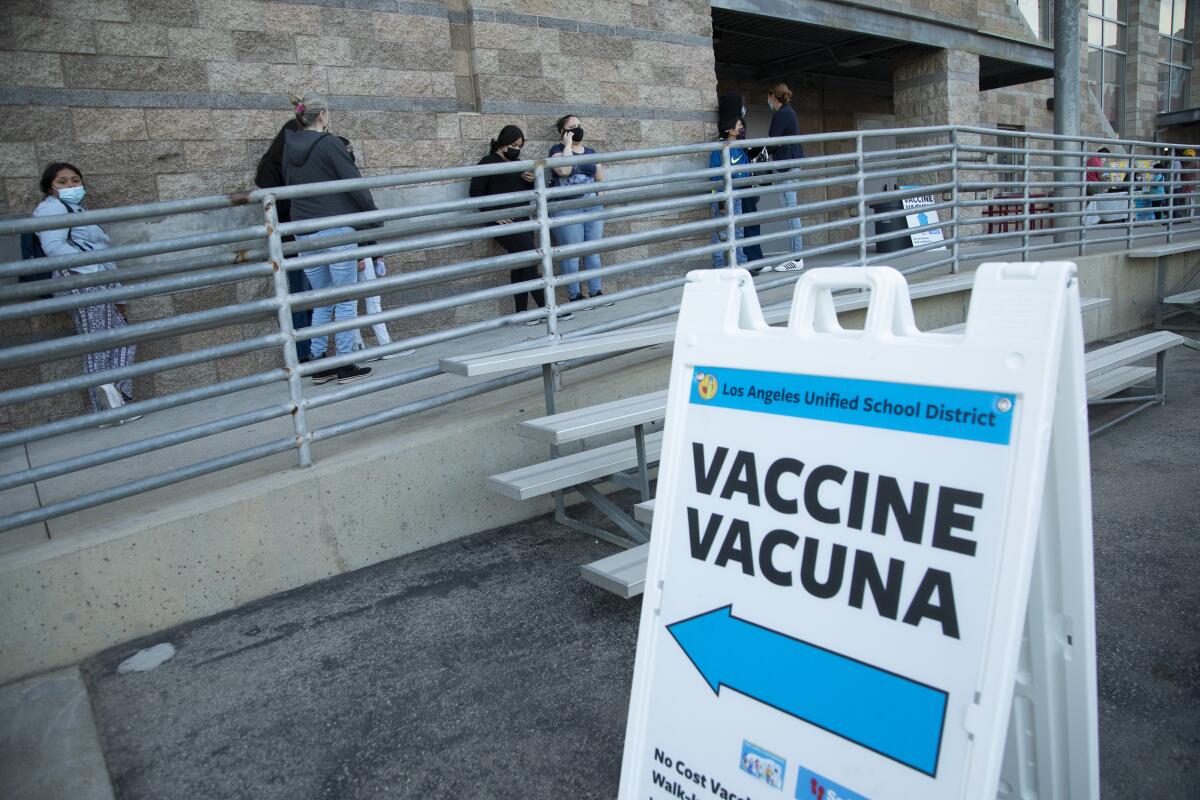
Faced with growing worries over a potential winter coronavirus surge, health officials in California and other areas are turbocharging the push for COVID-19 booster shots in hopes of getting more adults the extra dose as soon as possible.
The move comes amid initial sluggish demand for boosters, which has sparked concern that more people who got their initial vaccinations nearly a year ago will see their immunity wane further into the pivotal holiday season. In California, only 34% of fully vaccinated seniors age 65 and over have received a booster, as have just 14% of fully vaccinated adults.
Federal guidance says any adult can get a booster if they are at increased risk of COVID-19 exposure because of where they work or live.
State and local health officials are urging the public as well as pharmacies, medical centers and other vaccine distributors to take a liberal view of this — meaning that any adults are eligible as long as two months have passed since they got a Johnson & Johnson shot, or at least six months have passed since they received a second dose of Pfizer-BioNTech or Moderna.
Traditionally, the “increased risk” criteria outlined by the U.S. Centers for Disease Control and Prevention have been applied to those who work in places such as hospitals, schools, grocery stores or factories — or those who live in congregate settings like prisons or homeless shelters.
But the wording of the recently issued criteria is broad, and some health officials, including in California, are now increasingly pointing out that it can be interpreted in a much more expansive way.
Dr. Tomás Aragón, state health officer and director of the California Department of Public Health, sent out a letter Tuesday instructing vaccination providers to “allow patients to self-determine their risk of exposure. Do not turn a patient away who is requesting a booster.”
California health authorities, fearing another winter coronavirus wave, are urging all eligible adults to get COVID-19 booster shots.
Booster-eligible adults may include those who “live in geographic areas that have been heavily impacted by COVID,” those who “reside in high transmission areas,” “who work with the public or live with someone who works with the public,” or “live or work with someone at high risk of severe impact of COVID,” Aragón wrote.
There may also be “other risk conditions as assessed by the individual,” he added.
On Wednesday, the California Department of Public Health summed up its booster guidance as follows: “In general terms that everyone can understand, we urge Californians to get a booster if someone in their home has a medical condition or if they work around other people.”
The list of qualifying medical conditions itself is expansive, including being overweight, pregnant, a current or former smoker, or having high blood pressure, diabetes, asthma, depression or an alcohol- or drug-use disorder.
Based on all of those reasons, “pretty much everybody is eligible,” said Dr. Sara Cody, the health officer and public health director for Santa Clara County, Northern California’s most populous county. “We really encourage everyone to get out and get their booster shot.”
With only one week since 5- to 11-year-olds were eligible for COVID-19 vaccines, Orange County health officials are reporting ‘a very healthy demand.’
Officials have been regularly beating the drum for boosters in recent weeks, saying it’s important for eligible people to take advantage of the extra protection ahead of the Thanksgiving and Christmas holidays, which last year fueled the worst COVID-19 wave yet.
Gov. Gavin Newsom this week called the potential winter COVID-19 surge his “biggest anxiety.”
“While we were spared the worst in the summer, the prospects of a challenging winter are upon us,” he said Wednesday during a press conference to promote booster shots in Los Angeles. “And that’s why we’re doing everything in our power to prepare and to protect ourselves.”
While California is relying on an interpretation of the CDC booster guidelines to essentially throw the doors open, federal officials, for their part, are already evaluating whether to officially expand eligibility.
Just this week, Pfizer and BioNTech asked the U.S. Food and Drug Administration to allow boosters of their COVID-19 vaccine for anyone 18 or older. Results from a new study found that a booster dose resulted in a relative vaccine efficacy of 95% when compared with people who did not receive a booster.
The request comes amid concern about increased spread of the coronavirus with holiday travel and gatherings.
California’s messaging marks a shift from just a few weeks ago, when officials generally placed greater emphasis on urging elderly individuals and those with weakened immune systems to get the booster.
That was partly based on the CDC’s official recommendations that — for people vaccinated with Pfizer-BioNTech or Moderna — groups who should get the booster shots include seniors 65 and older, adults 50 and over with certain underlying conditions, and adults who live in long-term care settings. The CDC also recommended that all adult J&J recipients get a booster.
The CDC also made the boosters available to other specified groups, but stopped short of officially recommending they avail themselves of the additional shot. This included younger adults with an underlying condition, as well as those age 18 to 64 who live or work in settings that put them at increased risk.
As the CDC guidance notes, however, that risk “can vary across settings and be affected by how much COVID-19 is spreading in a community.”
In Colorado, for example, officials have taken the stance that, given how widespread coronavirus transmission is throughout the state, all adults are eligible for a booster.
“Because COVID-19 is spreading quickly throughout the state, Colorado is a high-risk place to live and work. Anyone who is 18 or older who would like a booster and is due for one should make a plan to get one,” the Colorado Department of Public Health and Environment says on its website.
California’s message is similar. Without a booster, health officials warn, vaccinated people will be at greater risk for breakthrough infections, which can lead to hospitalizations and death among the most vulnerable.
“If you think you will benefit from getting a booster shot, I encourage you to go out and get it,” Dr. Mark Ghaly, secretary of the California Health and Human Services Agency, said during a briefing Wednesday.
He added, “It’s not too late to get it this week. Get that added protection for the Thanksgiving gatherings that you may attend. Certainly, going into the other winter holidays, it is important.”
Vaccination rates are up, but there’s fear Black and Latino men will continue waiting until they almost die from COVID-19 or watch people they know die before getting vaccinated.
More than 3.7 million Californians have received a booster so far, according to the state Department of Public Health. By comparison, roughly 25 million people are thought to be fully vaccinated statewide.
The group of boosted Californians includes Daniel Loyd, 60, who said he received his booster as soon as he could.
Outside a CVS in Agoura Hills on Thursday, Loyd said he was not only concerned about his own risk factors, he has diabetes, but was also trying to protect those around him — including his wife, who has asthma, and their neighbors at the retirement community where they live.
Greg Mead of Woodland Hills, on the other hand, said he will not be getting a booster. He said he was fully vaccinated with J&J and felt unwell for three days afterward.
“I’m done with the shots,” he said.
It’s not uncommon for people who get a booster to experience a low-grade fever, or perhaps some chills or fatigue; it typically lasts for 24 hours.
“But all of it goes away. And it’s much more important for people to just put up with that one day of side effects, because they have the benefit of the protection for a long time to come,” said Dr. Marty Fenstersheib, vaccine officer for Santa Clara County.
Vaccinated parents say they are continuing to give human milk to their young children beyond six months or a year to protect them from COVID-19.
Unvaccinated Californians are still about seven times more likely to get a coronavirus infection than those who have already been inoculated. But Ghaly said the state is seeing more coronavirus cases among those who got their shots earlier on.
“We’re concerned about what it means for hospitalizations and pressure on our healthcare delivery system, but ultimately for your safety and protection,” he said. “So now is the best time to consider getting that shot.”
That’s especially important, health officials say, as California’s emergence from the latest Delta wave appears to have stalled. The number of newly confirmed coronavirus cases has plateaued in recent weeks — and COVID-19 hospitalizations statewide have been relatively flat since mid-October.
Nationally, new daily coronavirus cases are starting to climb — up 5% over the past week.
Studies have shown that all three COVID-19 vaccines have lost some of their protective power, and data out of Israel indicate that booster shots are reducing the risk of severe illness and death.
A study of 780,000 veterans shows a dramatic decline in effectiveness for all three COVID-19 vaccines in use in the U.S.
Recently, Dr. Anthony Fauci, the U.S. government’s top infectious diseases expert, cited a study published in the journal Lancet that found that, compared with people in Israel who received two doses of the Pfizer-BioNTech vaccine, people who got a third dose had a 93% lower risk for COVID-related hospitalization, a 92% lower risk of severe disease, and an 81% lower risk of COVID-related death.
A report published by the CDC in September showed that vaccine effectiveness against hospitalizations fell from 91% to 77% for the Pfizer-BioNTech vaccine four months after getting the second dose. Available data for the J&J vaccine showed that vaccine effectiveness against hospitalization more than 28 days after getting the single-shot dose was 68%.
But while boosters are an increasingly important component of the fight against the pandemic, health officials say getting more people vaccinated to begin with is even more critical.
Nearly 70% of Californians have already received at least one dose, and about 63% are fully vaccinated, according to data compiled by The Times. However, those figures remain well below what health officials believe is necessary to bring the pandemic to its knees.
“We are concerned about the winter. We’re concerned about rising case numbers, pressure on our hospitals from a number of other issues on top of COVID,” Ghaly said. “So do what you can today to get your vaccine. Protect yourself into the winter.”
More to Read
Start your day right
Sign up for Essential California for news, features and recommendations from the L.A. Times and beyond in your inbox six days a week.
You may occasionally receive promotional content from the Los Angeles Times.
